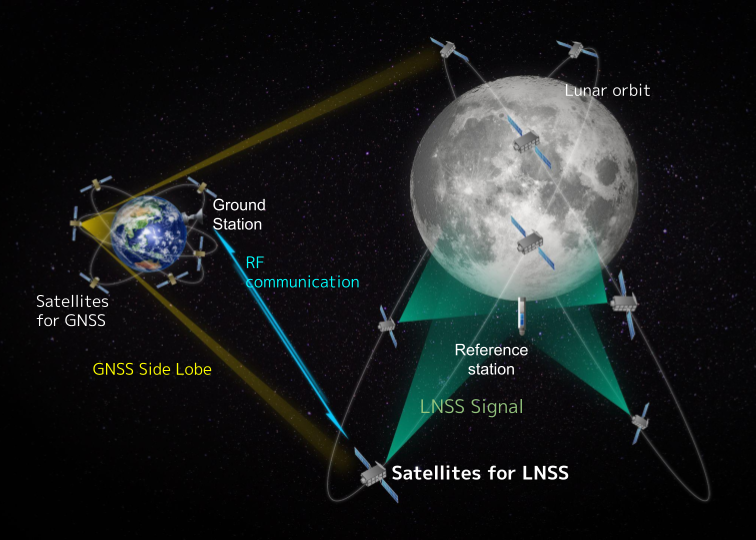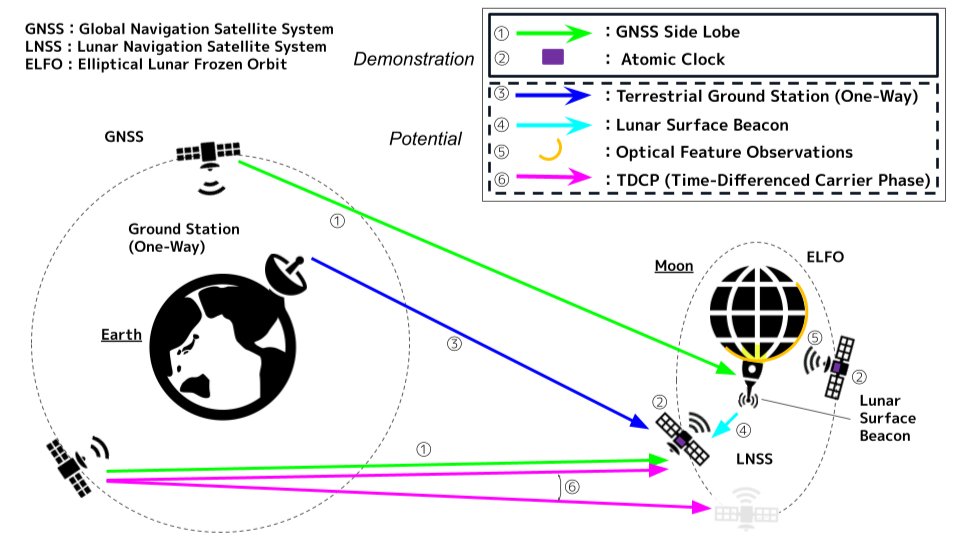Tokyo, Japan, December 11th, 2024 – ArkEdge Space Inc. (“ArkEdge Space”), a Japanese space startup based in Tokyo that provides comprehensive solutions from planning and design to mass production and operation of micro-satellite constellations, is pleased to announce that it has been selected by the Japan Aerospace Exploration Agency (JAXA) as the project provider for JAXA’s Feasibility Study (Part 1) towards Full Operational Capability (FOC)* of the Lunar Navigation Satellite System (LNSS) through a competitive bidding process on November 20, 2024.
*FOC: High-accuracy, wide-area, continuous operational services
This study will enhance the precision and resilience of lunar navigation and timing infrastructure, targeting the start of FOC in the lunar South pole by the early 2030s. Through this study, we will contribute to the practical operations of lunar navigation services, supporting the growth of lunar exploration and economic activities, while ensuring interoperability with other services.
LunaNet, an international framework for lunar communications and navigation, is being developed by NASA, ESA and JAXA. As part of this initiative, the concept of establishing a lunar navigation satellite system like a Global Navigation Satellite System (GNSS) is being promoted internationally. Known as the Lunar Augmented Navigation Service (LANS), this system will integrate Japanese LNSS as one of its satellite nodes. It will deliver to the Moon an Augmented Forward Signal (AFS), which will be standardized by LunaNet, together with European and U.S. navigation satellites. This will enable users on the Moon to access high-accuracy lunar navigation signals, supporting activities such as rover navigation and base construction on the lunar surface from the early stages of infrastructure development.
 Conceptual diagram of the LNSS System
Conceptual diagram of the LNSS System
Presently, with the increase in lunar activities such as the Artemis program, the activities of humankind are reaching the lunar surface, with the ambition to develop a strong lunar industry. With this growth, the demand for higher accuracy, wide area, lunar navigation services is expected to increase. In other countries, studies and development are already underway to achieve FOC of lunar navigation services, as a core element of critical infrastructure for a sustainable lunar presence.
This study focuses on enhancing lunar positioning accuracy by exploring innovative approaches and methodologies. In addition to evaluating demonstration mission techniques, the research will integrate advanced methods such as Time-Differenced Carrier Phase (TDCP), one-way ground station observations, support from beacons at the lunar South Pole, and optical observations. These enhancements will explore the feasibility of further improving the orbit and time estimation accuracy of LNSS satellites.
By ensuring interoperability with international systems, this initiative contributes to the practical operation of lunar positioning services, supporting the accelerating pace of lunar exploration and the expansion of lunar business activities. This research will be conducted in collaboration with the University of Tokyo.
Project Overview
- Name: Feasibility Study for Lunar Navigation Satellite System (LNSS) Full Operational Capability (FOC) – Part 1
- Objective: Advancing lunar positioning accuracy and evaluation methods
- Project Period: November 2024 – March 2025
- Reference URL: https://stage.tksc.jaxa.jp/compe/bid_box/FY2024-0196.pdf
<Related Initiatives by ArkEdge Space on LNSS>
ArkEdge Space, in collaboration with JAXA, is carrying out the research and development of navigation and communication services, advancing toward the Initial Operational Capability (IOC) to verify LNSS technologies. From FY 2021 to 2023, we have been working on several commissioned projects under JAXA’s Strategic Program for the Acceleration of Space Exploration and Utilisation (Stardust Program). Furthermore, ArkEdge Space has been selected as the implementation provider of the Space Strategy Fund’s technical development theme, “Lunar Navigation System Technology.” Moving forward, the company will focus on the development of LNSS demonstration satellites.

